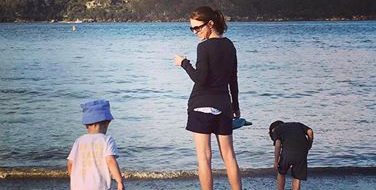I’m moving over to Substack--please come check me out there!
Category Archives: Uncategorized
Double Vision
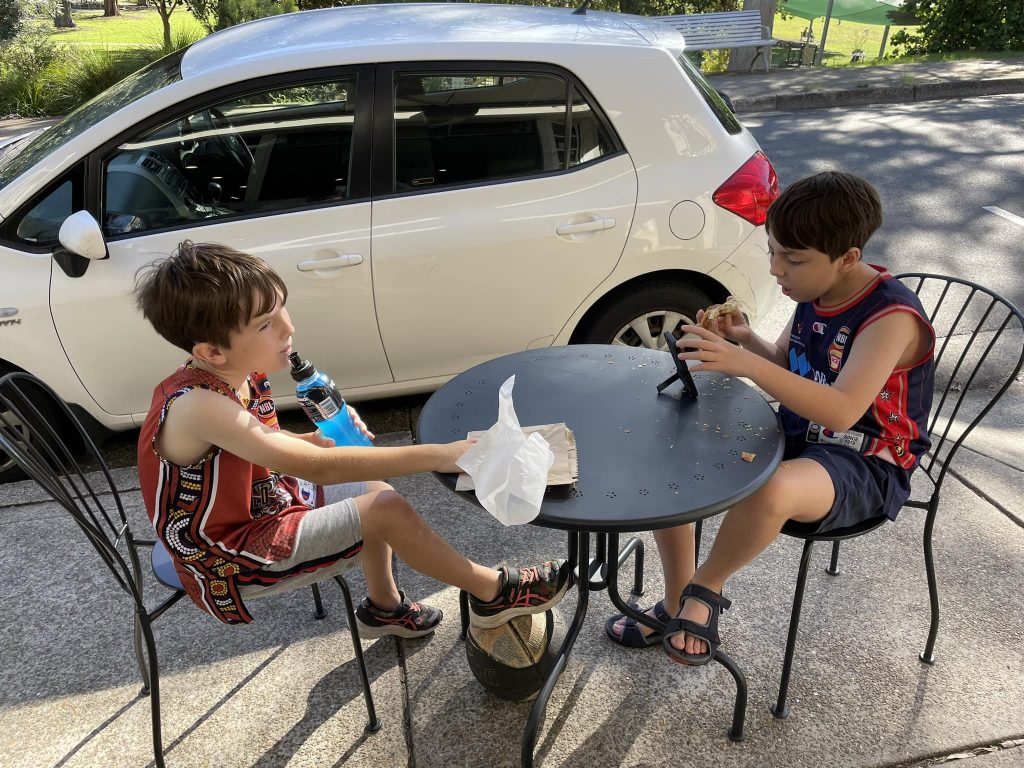
This morning, the boys complained about not wanting to go to basketball camp. It was to be their last one this school break, and they’re tired–end-of-school-break tired, as opposed to end-of-school-term tired, which are two different and very real things–and they were just DONE. To punctuate this message, The Kid barfed in the bathroom sink, and The Husband and I discussed how we’d manage it because, wouldn’t you know, this was the one day of the week I had something planned. He was working from home, so instead of playing basketball in a gym, the boys stayed home and watched it from a couch.
Meanwhile, I drove a half-hour to a university. I parked and walked through the rain, my travel mug of tea stuffed into my rain jacket pocket, sloshing and soaking the leg of my jeans. I tripped, only slightly less dramatically than Shiv on this week’s Succession, so by the time I arrived to my friend’s office I looked like a limping wet rat who’d pissed its left leg.
For nearly the next three hours, my jeans leg dried and I was immersed in the world of linguistics and autism. I sat beside my friend and in front of three computer screens filled with diagrams and articles and book chapters and more information than my brain could take in, and I loved every minute. My emotional connection to this work is powerful and propulsive, and its discoveries apply to my personal now even as I imagine all that I can do with it in the future, which I think is one way to define hope, this now-and-not-yet thinking.
Then I got home and talked to TK about some of those discoveries, and it was a gorgeous moment. Then I cuddled next to Little Brother on the couch to watch some (more) basketball, and it was another gorgeous moment. Then they started fighting and TK screamed about something after just screaming about something inconsequential so I thought the second scream was also inconsequential except it wasn’t, so he cried and accused me of not loving him as much as LB, and that was not a gorgeous moment.
He’s been accusing me of that quite a bit lately, and here’s the thing: I don’t love him less, but I have to wonder if it’s too easy for him to think that. I have to wonder if my tailored approach to parenting has its faults. You see, justice is one of his passions, and his idea of it is very narrow, and we’ve been working on the difference between equal and fair. I gave up on equal a long time ago with TK and LB because, it turns out, they are two separate people whose brains work quite differently, and therefore they can’t always be treated identically across the board. But fair? I guess I’m still working on that. And I have to be open to the possibility that there’s a different way for me to see things.
I’ve finally reached a point in my life at which my vision is, to put it technically, “all over the place,” and the optometrist is doing that thing where they train one eye to see well up-close and one to see well far away. Two eyes working differently while looking at the same things. Which is deranged, but also works, this contradictory approach to vision. “Deranged but works” might be an apt description for love, and life, and grace: the strengths compensating for the weaknesses, the hope that grace and I will fit together to see the whole beautiful picture.
Life and Death at the Ballet
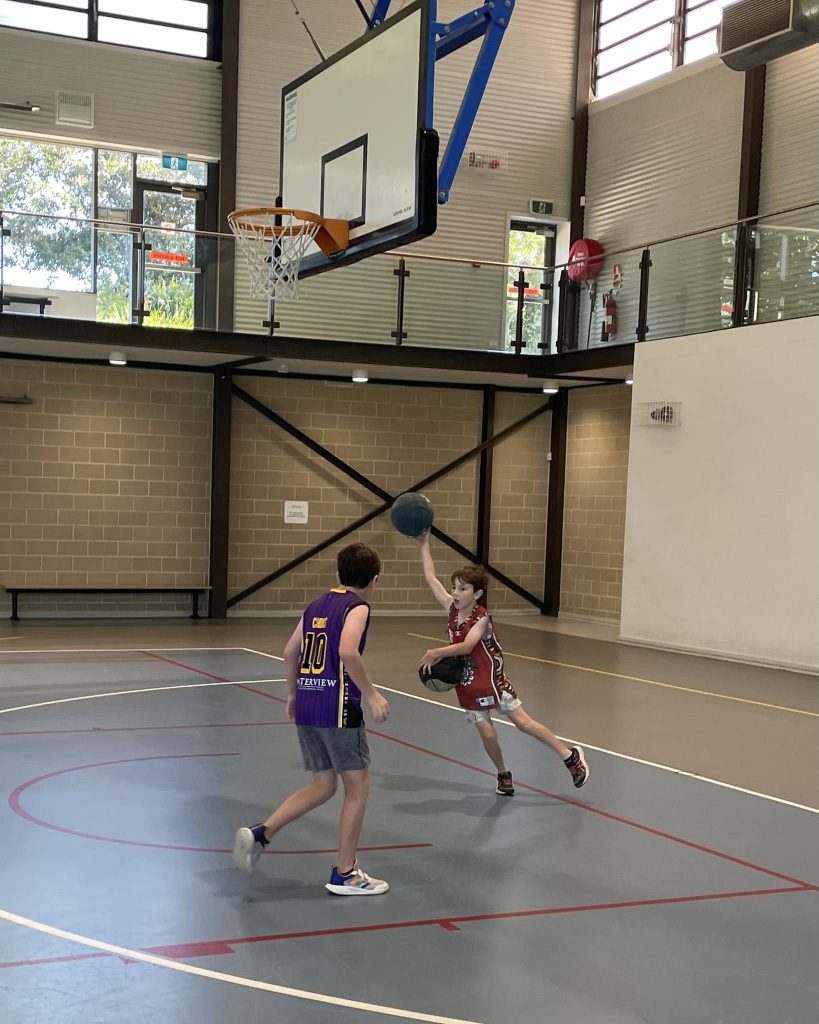
The boys have taken up a new scoring system. It was conceived by The Kid but now adopted by Little Brother as well, this mental recording of “problems and benefits” as TK first named it, detailing each to me immediately upon seeing me at school pickup. They’re at basketball camp a couple of days this week during the school break, and the system is used for this too: a best and worsts of the day, itemised in the form of a scoreboard between two teams of the boys’ choosing (NCAA this week, in honour of the recent championship).
So in a few hours I’ll find out if Baylor beat TCU or Gonzaga was squashed by Kansas.
This winning and losing, black-and-white analysis of the world is common among children and hard to resist for adults, this one at least. Good and evil has a comfortable, familiar ring to it, especially when I’m always on the hero side. It’s easier to choose a lane than admit where we actually are: sitting in the middle, on the line (between good and evil) that runs through each of our hearts, according to Aleksandr Solzhenitsyn; permanently residing in the tension that characterises all of life.
I think about this tension–this push and pull of existence–when I run in view of our beaches, the water sweeping up the shore and receding back; my ever-uttered prayer of “I’m grateful but” that is its own scorecard; the pain and elation of a cold-water swim. Nothing, it seems, can be purely good or bad unless we assign it those qualities and write it off as such; dealing with the tension requires a fortitude, a self-knowledge, a strength beyond ourselves and what we can see. And maybe just more time than we feel we have for it.
I picked up a little memoir at the library recently because there it was, staring me in the face from the “Read in 10 Days/No Renewals” section, and while I won’t be attesting to its literary value, I was caught by a line at the beginning, an observation of a locale familiar to the author: “How beautiful it all is…and also how sad.”
I mean, the tome is not on track to win the Pulitzer–there have been countless moments when I’ve pushed through sections that the boys would call cringe, and I’m pretty sure my face has been that grimace emoji for the duration of my reading it–but that little sentence, it got me. Just like Sunday’s episode of Succession did, when those maturity-challenged adults, in the throes of grief, who typically do nothing but posture and avoid talks of feelings, kept naming theirs to each other in what had to be the most repeated line of the hour: “I’m sad.” Then the next lines would be something like “Chuckles the Clown? I think not,” and I would find myself laughing through tears, which is actually my favourite emoji because it’s so true.
Yesterday I went to the ballet with my friend and near the end of the first act, a kerfuffle of sorts occurred two rows behind us. While the band played on and the performance continued, a woman was attended to by a doctor then carried out, all of us wondering (and never finding out) what happened. All of it set to centuries-old orchestral music, all of it facing a stage full of dancers. Life and the show going on beside each other.
In this moment I am older than I’ve ever been and younger than I’ll ever be, straddling tension all over the place with a neck that could have been lifted if I hadn’t taken (failed) that stupid dental exam. I’m sitting with my feet on the dog, cold from the grey autumnal rain from a few minutes ago that has switched to a blazing sunlight and will probably go back and forth a few more times, on the ill-advised cream-coloured sofa that we bought because the boys are no longer pissing and shitting themselves (as much) so that should be safe, right? No, says the sweat and dirt and life that has darkened these cream sofas into more of a dusty tan, which is fine (I say…I’m grateful but) because perfection is boring anyway.
Prisoners of Hope
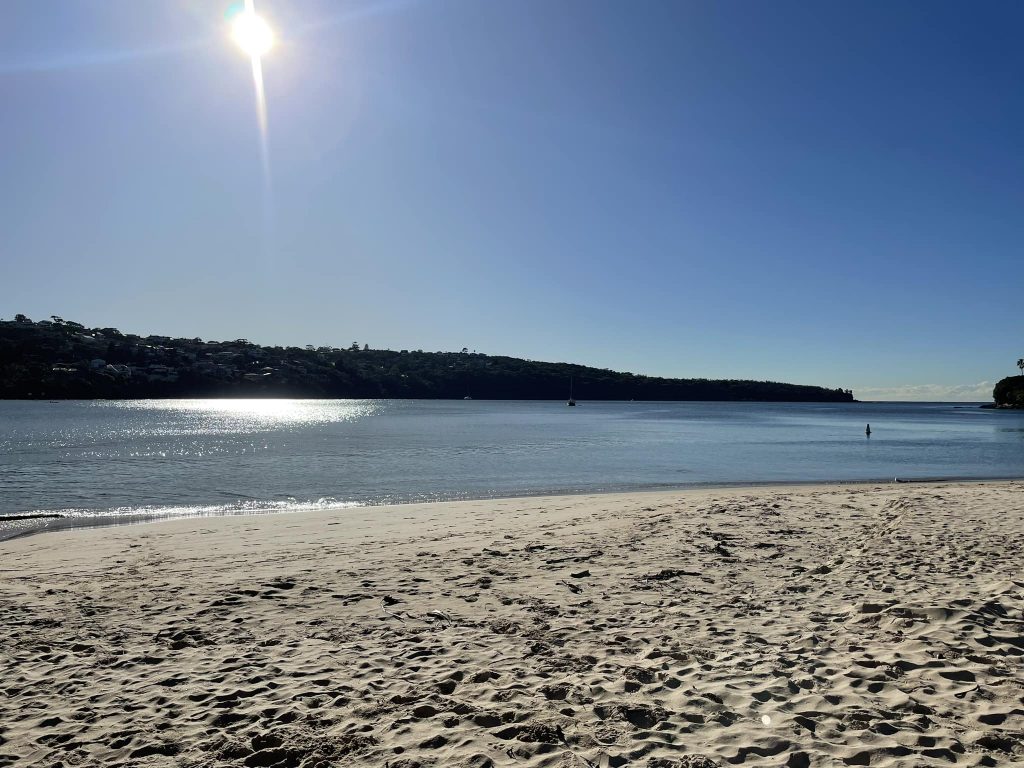
“In this country…if you’re an artist, you’re guilty of a crime: not that you’re aware, which is bad enough, but that you see things other people don’t admit are there.” –James Baldwin
When I took a fiction-writing course in college, our professor used a textbook that began with the axiom “write what you know.” It’s hardly a new one, or even unique to that book, and it stayed with me over the years. The other day I watched Leigh Sales interview Lin-Manuel Miranda in Brisbane and he offered another writing tip: write what you haven’t seen but know is true.
I’m taking this one to heart lately, which means I write a bit about autism and politics, which some people tire of (and which I think is hilarious because I don’t give a shit). I write about what I don’t see–a world that treats neurodivergent and disabled people as whole individuals worthy of the same rights as their neurotypical and able-bodied counterparts; a country that used to be great but is now infected with a sickness resulting in children dying en masse in schools. I write about what I know is true: that the annoyance people (including me) may be prone to feel toward those whose brains work differently should not be our guiding principle in how we see and treat them; that children deserve to feel safe in their classrooms.
Nick Cave wrote in Faith, Hope and Carnage that “hope is optimism with a broken heart.” I write, and live, hopefully from a broken heart: with the realism and scars that optimism lacks. I know that asking the world to treat the different as whole is a tall order when I often can’t make it through a day before I’ve failed to do it myself; heated exchanges in the car, swears yelled in anger; fights ending in tears. But I also know the hope that emerges from brokenness: forgiveness extended after apologies; hard and real conversations that forge a new way ahead. I know light because I know darkness; I know triumph because I know failure; I know whole because I know incomplete; I know hope because I know brokenness. It’s only those who can’t admit the truth who are truly adrift.
I know the landmarks because I’ve wandered.
I was reading my new favourite fiction author recently and came upon a passage where one of the characters was walking through Grand Central Station, observing the ceiling that is painted to resemble a sky, and noted that its colour was more green, like the sea. I knew exactly what that character meant, what they saw, because I’ve been there: cast from South to North, known to unknown by life’s circumstances, which is to say grace, and knowing this landmark, and finding this sentence in a novel to be yet another expression of home to me. I know that colour.
I know that one of the darkest forms of cruelty is to demand that someone deny their identity, which is why now I am drawn to those who have endured that demand, and why I refuse to unsee who they truly are, why I refuse to continue that demand that pushes them to the margins of society, because they belong embedded with the rest of us who have always, in our privilege, been here. The Kid told me that he and a partner are working on a project at school that had them choosing a person who had been discriminated against. “We picked that woman you told us about, on the bus,” he told me, referring to Rosa Parks, her story that I’d told him and Little Brother, about what happened in my hometown, an event I’ve come to see differently over the years because of time and change and grace. Because of broken but whole hope.
And this week, as words are read that started as prophecy and are now memorial but also proclamations of hope, I think about what it means to be a prisoner of hope: willingly enslaved to something bigger than myself, something outrageous and counter-intuitive yet somehow inevitable: a tomb emptied by hope’s fulfilment. I told the boys about it the other day, how the water was so clear during my swim that I saw the divots in the underwater sand left by the stingrays, where they’d slept overnight, and I’d been unwittingly swimming over them all these years: these temporary homes known only once they were empty.
Failing to Freedom
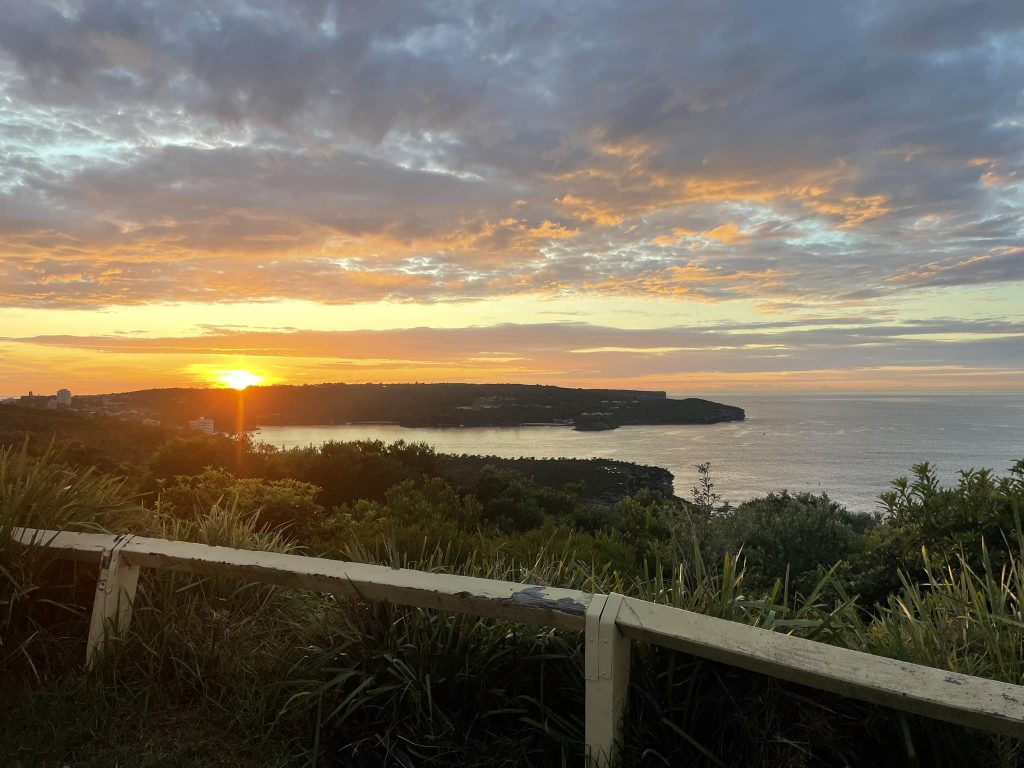
I failed my dental exam. Technically, I passed two of the four sections and failed the other two, which amounts to a failure and is actually exactly how I thought I did. Yay for self-knowledge!
I’d like to preface everything I’m about to say by acknowledging my privilege in that I am no longer a single female seeking to support myself. Hell, even when I was a single female seeking to support myself everywhere from Birmingham to Savannah to New York City, I knew I wasn’t in danger of being tossed out onto the streets. I’ve always had some version of a family to come home to. And presently, I have a husband whose work supports us, so the outcome of this test was not the difference between eating and not eating tonight.
(Interest rates are rising, however, which means the rent [mortgage] is about to be too damn high, which is what necessitated my taking the test in the first place. The pay for volunteer ethics teachers and canteen workers at the boys’ school is shockingly low (read: zero), and it’s time for me to supplement the income.)
The question, now, is…how? How to supplement said income, how to use my training or talents or passion, all of which might not converge in the same spot (again, what privilege to even be able to ponder this question!)? I think about the South American candidate I met during the exam who was taking it for the second time, who is a single mom who just brought her son across the ocean to live with her, who was a dentist in another country and, until she passes these tests, is an assistant here. I think about how GD lucky (fortunate, #blessed) I am, whichever way this goes.
This is now how I used to respond to failure.
Failure, at least however I used to define it, wrecked me. And not just because I landed in the middle of the pack on a dental practical or didn’t get into the college’s premiere sophomore social networking group. The worst thing about failure to me was its public nature, that people would find out I wasn’t the best, wasn’t chosen. This was so painful because I didn’t know my worth apart from recognition. Now, I watch as my kids are surrounded by markers of achievement and opportunities for awards and…I’m kind of glad they saw me biff this one. For me, and for them. For us, because it didn’t change the way they saw me one iota and because it provided AFGO* to recognise that life has a funny way of going on and we are so not in charge of it, or at the centre of it.
Yesterday I submitted an essay to another writing competition, six months after the ceremony where I failed to win an award after being shortlisted among the elderly women, one of whom had to lie down during the whole thing because of her blood pressure, and honestly, this one wasn’t all that great. The dental exam? I don’t know if we’ll sink more money into that venture or not (even though my friend told me there’s a way to write it off and I wish she hadn’t). I’m dealing simultaneously with being bummed that, in a way, I let The Husband down because passing would have taken some pressure off him, but at the same time, I wonder if maybe this is one of those moments in marriage when he has to face/grieve the space between how (who) things are and how (who) he’d like them to be? Finances aside–and I know they matter–maybe there’s a part of me that needs to make peace with occasionally being a disappointment.
It’s a little weird how okay I am with that, after a lifetime of running like hell from it. Feels a bit like…freedom.
*another fucking growth opportunity. I believe that phrase was coined by Glennon Doyle.
Bloom Where You’re Replanted
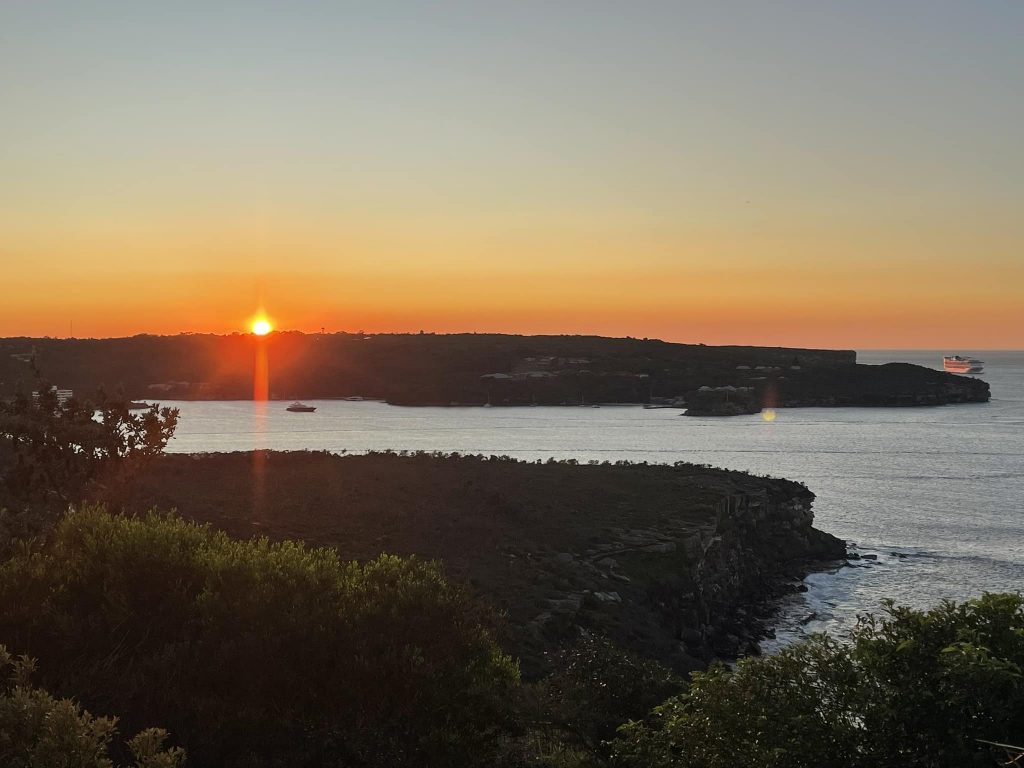
I am currently awaiting the results of my dental exam while filling out an application for a PhD program in linguistics. Does this make sense? Not on its face, no. I’m forty-five; I should know who I am and where I should be by now, right?
Turns out there’s a lot I don’t know and a lot I’m still figuring out. For example: the sun is rising later and setting earlier and these bookends of the day compressing as we round out the first month of (a very hot) autumn means that I delivered my annual autism talk to The Kid’s class last week. It was the sixth time I’ve done it; many of them were anticipating each slide before it appeared onscreen. (How wonderful to be known like this!) This year, I finally had the bright idea to do the same talk for Little Brother’s class. And since I know him–or so I thought–I surmised that it just wouldn’t do to make the whole thing about TK; I should also throw some LB into the talk too. When I asked him, though, he gave me a hard pass on including any photos of him.
What he didn’t do, though, was say no videos. So I pasted two in from when he was a baby, and when I got to that slide yesterday, expecting an appreciative grin, I instead got a stone-cold glare. Afterward, he said, “You know, Mom, there are SOME things we don’t have to SHARE.“
Which, now that I think about it, probably negates debunks the right I think I have to even tell this story. Or have this blog…
When I talked to both boys’ classes about TK and his halo experience, I compared the healing of his atlas bone post-surgery to the healing of a broken arm or leg, and that while those bones can be protected by a cast, you can’t wear a cast on your neck. I talked about the healing of a bone: how the doctor has to first reset, then immobilise, the bone. And I’ve been thinking about how, sometimes, grace does the same thing to us: we require resetting from what we were before, or where we were headed, before we can grow the way we’re actually meant to. I think about my dislocations, which were actually relocations, to New York and Sydney. Into autism and out of dentistry and now, either back into it or into something else, TBD. From landlocked to coastal, northern hemisphere to southern, churchgoing to on a break until she can get her shit at least marginally together on behalf of the disabled and abused.
TK said the other day, apropos of nothing except what was going on inside his head (which is to say, everything), “a flower’s worst nightmare is the beach.” And I had to take a moment right there as I was sliding into the driver’s seat, because between the two of my kids I have been taught some lessons this week. Trying to grow where we’re not meant to be, which is really just trying to be who we’re not meant to be, is not just fruitless–it is a nightmare. I would know.
And yet there is that moment when you’re disjointed, prior to the Doctor resetting you, when you just don’t have the whole story yet about how the pieces will fit together to make a whole. In his genius book, which is actually just (?) a conversation, Nick Cave calls this the before knowing: “you write a line that requires the future to reveal its meaning.”
Giving ourselves the space to find out all we don’t know (which is, in itself, an admission that we don’t know all), and then growing in this space? This is grace.
Holy Disruptions
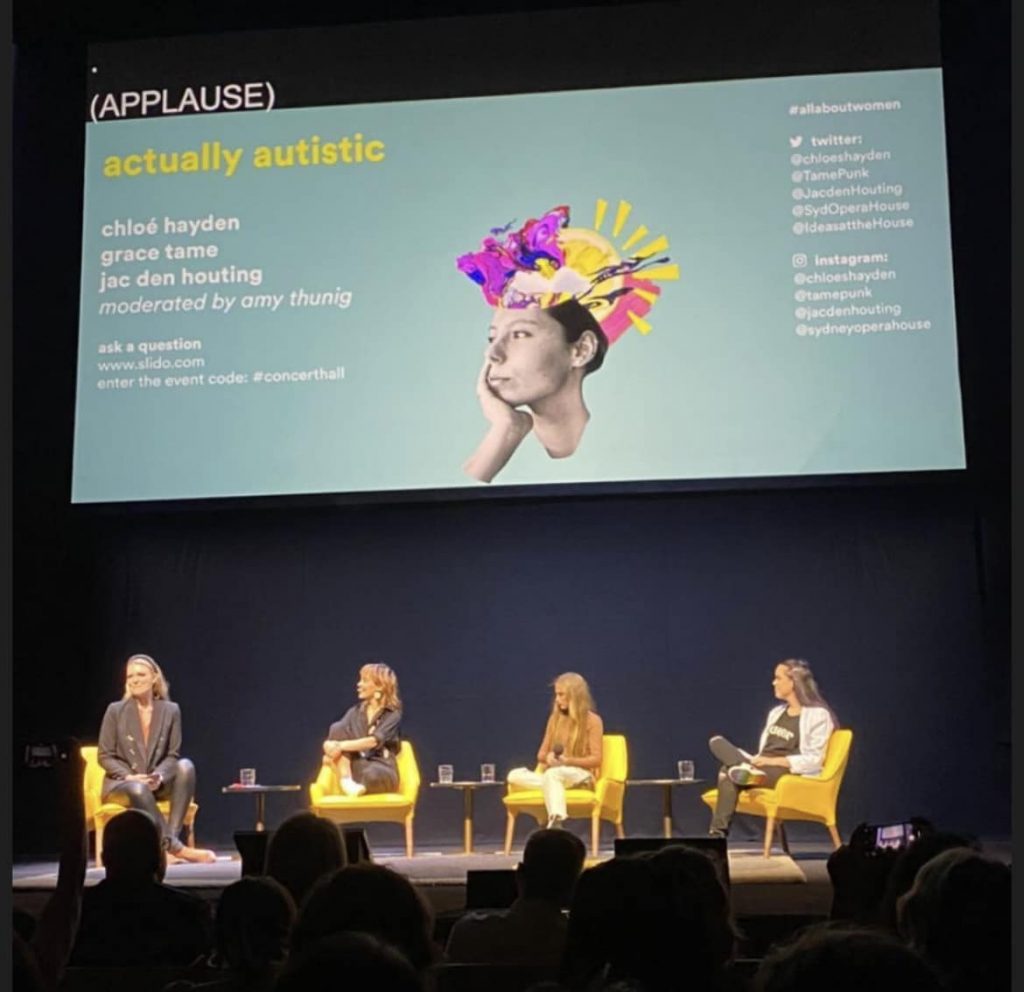
On Sunday, I ferried into the city and met a friend for a talk at the Opera House called Actually Autistic. Onstage, a panel of four autistic women talked for an hour about themselves and their experiences and I sat, laughing and crying–in recognition on The Kid’s behalf at the beautifully varied sameness of it all, the commonalities among those whose brains process life differently, and in gratitude of the way these women were willing and able to express that.
This varied sameness, this similarity within diversity–it’s a pattern. Pattern is something autistics excel at recognising, and sameness is something TK loves even more than I do, and this pattern of sameness/diversity is one of the many paradoxes of life that I’ve come to appreciate after so much time of trying to meld the two opposing components into something more understandable. But mystery isn’t always meant to be solved, and what seems contradictory can end up being a beautiful complementarity, an expansion and even rejection of the smallness we impose on life when we try to fit it into sensical categories just so we feel more comfortable with it all. Just so it fits our own narrative.
Holy disruption is an idea I’ve come to know well in life, but I came to a new familiarity with it as I read that book I mentioned. The holy disruption of disability, and disabled people, and the gifts they bring (other than the convenient ones invented by and/or for them, like telephones and bicycles and texting and touch screens and the list goes on and on). It’s a disruption that counters most comfortable narratives, and the church in particular has done a shitté job of recognising and accomodating this disruption to its often staid and static existence.
It’s another place where sameness within diversity comes in: the recognition of the disabled not as a community to condescend to, to be charitable toward, but a group of our equals who deserve the basic human rights we the abled and neurotypical have enjoyed for all of humanity’s existence.
Alas, my soapbox is teetering under the weight of my outrage. I’ll clearly need to have it reinforced because I am nowhere near done.
Last night we went to the final game of the NBL Championship and watched as the Sydney Kings fell a dozen points behind the New Zealand Breakers then clambered their way back to a lead that held to the end of the game. Championship won. And there we sat, and stood, and jumped our way through it, the boys and their friends screaming with glee and frustration and dissolving into tears at times over the surprising emotional intensity of it all within a stadium that was truly electric in its near-uniformity of purpose: supporting this team to a win. That sameness of desire among a group of 18,000 people, and one of my boys clinging to the railing in front of our seats while the other watched with occasional outrage at the ref’s calls, headphones in place to block out the sounds that his ears hear more powerfully and intensely than the rest of ours do.
The surge ahead in points came toward the end of the second quarter, a welcome deviation from the narrative thus far, but most disruptions aren’t as welcome. There is a “yes but” aspect to life and faith, a “blessed–with reservations” quality to our existence this side of perfection, that is exhausting to fight against–though I have tried. Now I’ve been worn down enough by life–by grace–to do more of a dance, even an embrace, with these paradoxes, these seeming-contradictions-but-actually-complements, the way love can throw us across oceans and into opera houses and stadiums that have become more familiar than churches yet are also houses of worship simply because grace and its source cannot be sheltered into existence: they exist unfettered, showing up everywhere, but especially in the spots that need to be upended by beauty.
Listen for the Heartbeat
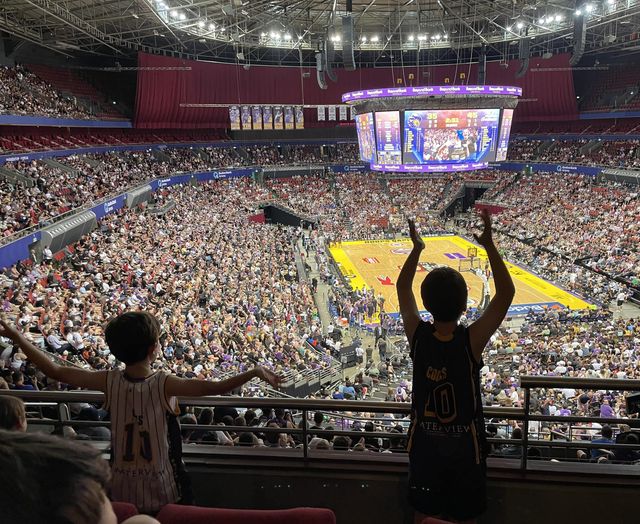
I remember, for both of our boys, that monumental appointment with the doctor–past the initial confirmation stages of pregnancy, into the early ultrasound visits, and then finally…the Doppler heartbeat moment. The placement of the device on the belly, the searching, the anxiety, the discovery. The quiet flutter at first growing into a steady, sure galloping. The confirmation and security it brought every visit after.
The Sister sent me an audio file of The Niece’s heartbeat, which I saved to my music library, the year before The Kid’s became a part of my life, a few years before Little Brother’s did. Feeling like a sentimental creep, I would pair it with José González’s “Heartbeats” and think ahead to a time when that kind of rhythm may/would rest within my own belly. Now that they have, and now reside outside it, I can hardly believe they were ever there: ever small enough to fit there, ever that fetal-fast beat compared with the slowed-down thrum of childhood that I feel when they rest their huge heads on me at the end of a long, full day.
There is a heartbeat to all things. When I was in the city last week, awaiting entry into the building where I took my dental exam, I was reminded of the city’s heartbeat, the one I heard daily on the streets of New York: the banging of steel as it’s gathered and formed into buildings that become skyline; the push-pull of buses stopping and starting at traffic lights; the walking signals turning off and on and the human traffic responding to them. I hear a heartbeat on the basketball court when the boys play in their new leagues: the beating of the ball on the ground while it’s dribbled and the beats between shots that soar into the air then return to land after each shot, successful or not.
These games–oh, these games. And I thought an exam was stressful! My heart running out on that court within them now, thirty minutes spent in their sweat and my anxiety. I remember back when I was a spelling bee champion (hey, it’s a sport too; it even runs on ESPN) and would watch The Dad leave the venue. I thought he was bored until The Mom told me he couldn’t handle the pressure. It was his heartbeat for me, love expressed in a way I didn’t recognise until I did. And now…I get it. I plant myself in the hard plastic seat and watch LB’s shots, his confidence, his focus, on Tuesdays; and on Saturdays, I watch TK’s hesitation, his own nervousness, his quick passes. I know his unsureness as both his and my own, and I ache for his inclusion even as it’s happening in front of my eyes. I ride this emotional coaster for thirty minutes that feel like thirty years then watch him come off the court, grinning, and I realise that maybe things don’t have to be as fraught as I think they are. But I doubt this will change anytime soon. Ever since I heard their own rhythm next to mine, my heart has only beat one way: relentlessly, painfully, wonderfully. For them.
Didn’t Know You Were Here
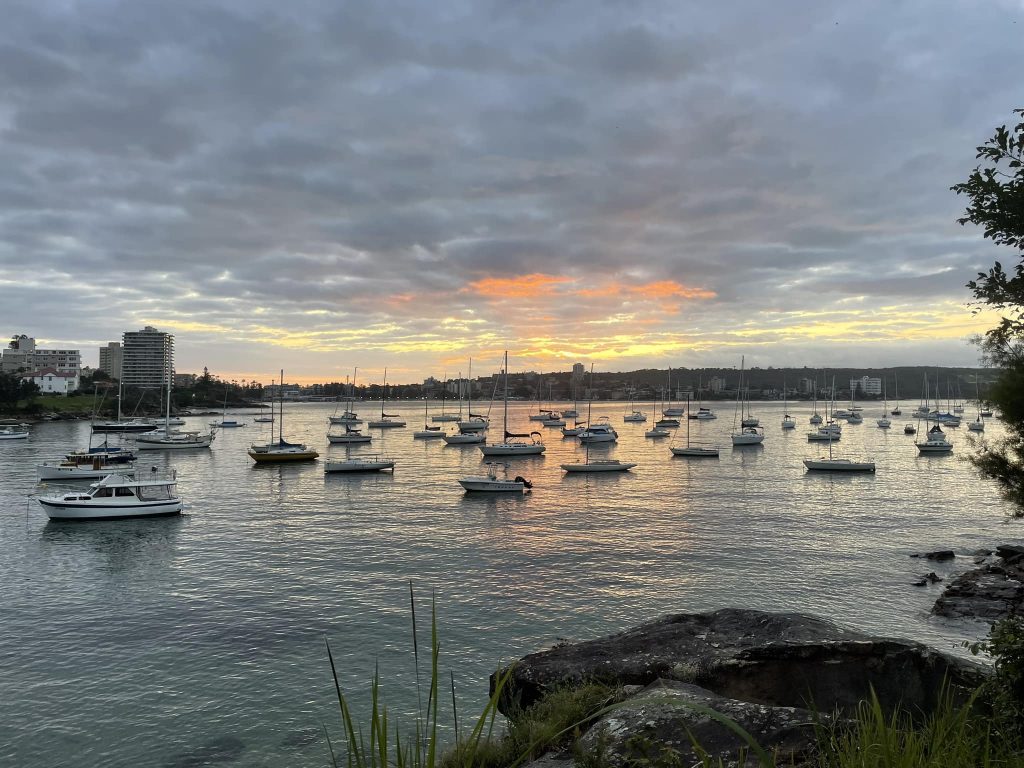
In one of my favourite stories, a man is on the lam, running from his brother, and so down on his luck that he has to stop in the middle of a journey through the wilderness and use a rock as a pillow. While upon that pillow, he has a crazy dream–a stairway to heaven moment, if you will–then awakens in his makeshift campsite to see it with new eyes; specifically, to see it as a “gate of heaven.” A place with God’s fingerprints just all over the place, indeed where God is totally hanging out, unbeknownst to the man, pre-rock pillow.
We went camping a couple of weekends ago, our second visit to the same site with the same group, and though no rocks were used as pillows (fine, we went glamping, our tents were already set up when we got there, sue me), it was definitely my definition of roughing it. Sure, there were hot showers available and a cafe onsite, but my phone lay uncharged much of the time and I peed in a creek. Roughing it. Not a place where you look around and think, God? Oh yeah, he’s TOTALLY here. Right beside this pile of horse shit, probs.
I tend to see glory in more…luxurious settings. Natural ones, sure, but natural ones with…amenities. Down pillows rather than rock ones. Spacious marble showers instead of cement stalls with a grate on the floor. This trip has become a tradition because of the company we keep while on it, and the fact that the kids love it, and I do too–really!–but I tend to agree with The Sis, who once said, “If God wanted us to camp, then why did he invent hotels?”
I wonder how many other places I’ve been prone to skipping out on glory because the accomodaysh, as it were, may have been subpar.
By the time I post this, I will have survived–God willing–two days and 280 questions of a dental exam to be licensed (licenced) to practice (practise) dentistry in Australia. Yay. I will have passed or failed it, though I won’t know for several weeks. My head is (temporarily) overflowing–or at least reasonably cluttered–with facts about dentures and implants and periodontal disease, while on the side I’m planning attendance at lectures on linguistics and sorting out my slides for talks on autism at The Kid and Little Brother’s school and reading books like this one (how great is that title?!). Stoking the fires of my passion while tolerating the fumes of rotting teeth and expecting glory in both places, simply because I’ve been around long enough to be proven wrong when I only expect God to appear at the Four Seasons, aka The Places I’d Rather Be Rather Than a Testing Centre at 8am Running Dental Scenarios on a Computer Screen.
If God is in this Chili’s, then he can be at a Pearson VUE testing centre. He can be in all the places I missed before–campsites, the world of disability, advocacy work, moments spent arguing with TK for the 569th time over why he has to brush his teeth. I just found him, matter of fact, in my own internalised ableism, something that showed up when I took this ten-minute test and realised that the way I’ve been defining my own worth by my productivity for much of my life has contributed to a mindset that marginalises those whose bodies don’t work the way mine does. Since those early days of equating myself with my accomplishments, though, I’ve had the opportunity (read: been forced by grace) to experience and stay in discomfort: mine at first, when I began to realise, and finally accept, that some of my parenting experiences would be out of range of the “norm” (whatever the hell that means), then others, as I finally offloaded my awkwardness onto people who hadn’t gotten that access code* yet.
So now I’m looking for glory just everywhere, for God to have his handprints on just everything. Cement stalls, glitter-strewn pride parades, photos of rotten teeth, meltdowns, fights and apologies–it’s like a scavenger hunt full of surprises, this grace that hides in the spots we’d least expect it then pops out, leaving us full of wonder: “How awesome is this place! This is none other than the house of God.”
*the one where we’ve stopped pretending like normal exists and, instead, we just let everyone be who they are and it’s a wonderful mess
Will Write for Attention

Fifteen years and a lifetime ago, I was completing two years of post-grad work to obtain a certificate of specialty in pediatric dentistry. Those two years were so awful they propelled me from Alabama to New York City, and they were awful for many reasons, but one thing I did right — or so I thought — was my major research paper. It focused on autism and dentistry and was, I believed, both well-researched and -written.
If I could find that paper now, I suspect I’d want to delete the entire file. Because about a decade after I submitted that paper, my older son was diagnosed as autistic — and that was when knowledge went from factual to personal.
Read the rest over at Mockingbird!
